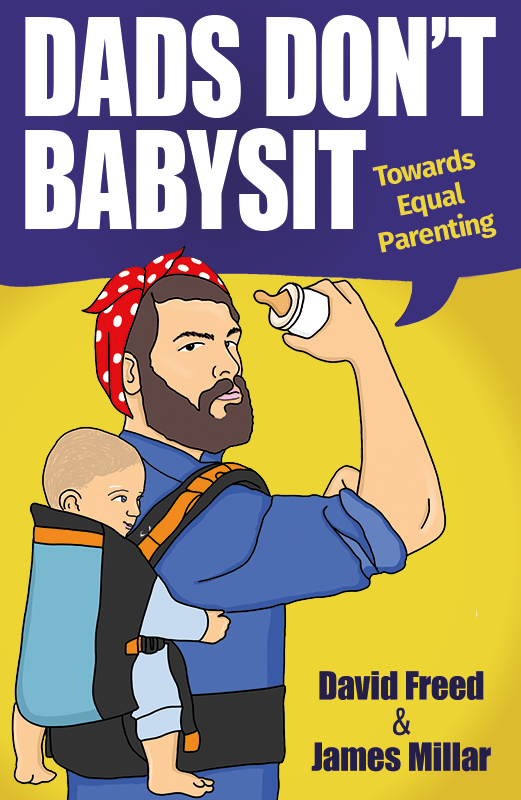Every now and again, someone produces a book about fatherhood and parenting that genuinely gets me excited. Dads Don’t Babysit Towards Equal parenting, the work of writing duo and fathers David Freed and James Millar is one such title.

I had a sneaky suspicion this was going to be a well-researched book about the challenges facing modern fathers. I’m pleased to say it doesn’t disappoint. What exactly is it about and will it be worth investing £11.99 in a copy when it goes on general release on 14 September?
A detailed look at family life and men’s role in it
Let’s be clear, this is not a helpful guide offering hints and tips to new dads. This is a detailed exploration as to why dads don’t always contribute to family life as much as women and what can and should be done to help dads be more active fathers.
The authors have split the book into six parts. It starts by arguing the case for more equality in parenting and goes on, in part two, to explain why there is a paternity gap (essentially, why dads are not always as involved with family life as they could be). Parts three and four blow apart the biological myths about family life, IE that dads should be breadwinners and that mothers are natural carers. Part five asks why society puts pressure on women to do childcare and the book concludes by making suggestions as to how the parenting world and society could be made more equal for both genders.
Along the way, the authors speak to various specialists and policy makers. These include David Lammy MP, chair of the All Party Parliamentary Group on Fatherhood and Jo Swinson MP, Deputy Leader of the Liberal Democrats and the individual responsible for introducing the UK’s shared parental leave policy when the Lib Dems were in coalition Government with the Conservative party.
There are also first-hand accounts from various parents. Yes, okay, declaration of interest, I do crop up on the pages from time to time myself giving opinions and talking about experiences I have had as the main carer for my two daughters. I shall, however, move swiftly on.
Never judge a book by its cover

I simply can’t go on without mentioning the book’s cover. It shows a bearded man with baby strapped to his back, wearing a red headscarf in the style of Rosie from the famous US WWII We Can Do It poster. I can’t deny it, my heart sank just a little bit when I saw this.
Yes, okay, it’s a minor point but I’ve seen this image used many times in relation to dads and it’s become something of a cliché. It is also very similar to the cover of Gideon Burrows’ excellent book Men Can Do It, The Real Reason Men Don’t Do Childcare.
Burrows’ book, which was published in 2013, is based more on personal experience but there are similarities between the two titles. I think the big difference between them is that Burrows title was produced before shared parental leave came into force. Five years down the road, the discussion regarding fatherhood, active dads and gender equality for women has moved on. The two books complement each other very well.
What needs to change
Freed and Millar take a good look at how support services are provided to new parents, pointing out they are almost exclusively aimed at mums leading to dads being ignored. They argue that gender stereotypes are forced upon kids at school, thereby affecting how they think of themselves (girls are unwittingly taught that they are nurturing and caring whereas boys are informed they should tough and provide for their families).
The book makes numerous other well-argued suggestions for improving equality in the parenting world. I won’t, however, cover them in detail or else I will spoil the surprise for any readers.
Nonetheless, there is a very interesting section dedicated to gatekeeping mums. It explains that mums are essential in control of shared parental leave. I have in fact heard of shared parental leave being referred to as “transferable maternity leave” and Jo Swinson pretty much agrees in the book that this is the system that was put in place in the UK.
I have long felt this is a real shame. It’s one of the biggest failings of the UK’s parental leave system and it should be overhauled. It’s a personal bug bear of mine that mums and dads still refer to maternity and paternity leave when anything beyond the statutory two-week leave mothers have to take is, in fact, shared parental leave and should be referred to as such. The mentality around the early years won’t change until we all accept mums and dads equally equipped to look after their offspring. That, however, is just my opinion.
The book also compares the British shared parental leave system with those in other countries. The book looks at the experiences of working dads and I was very happy to see it also considers the ‘mental load,’ one of the most under-recognised challenges faced by any homemaker, be they female or male.
The book isn’t without humour. One of my favourite sections looks at how popular culture should change to better reflect the contributions fathers make to family life.
Feed and Millar discuss how the US sitcom Modern Families reflects well on the one stay at home dad character to feature in the series, but all the other dads in the show are portrayed as distant and incompetent. They also call-out Daddy Pig from the Peppa Pig cartoon, but in an amusing twist admit to liking the cartoon so don’t want to see him or the cartoon banished! They also admit to being fans of the BBC series Motherland, though concede Kevin, the stay at home dad character, reinforces a negative stereotype of fatherhood.
This section could have been expanded further by referencing the ITV hit Broadchurch. Although many people didn’t seem to pick up on this, major character Joe Miller, played by actor Matthew Gravelle, was both the main carer for his offspring and a callous murderer. If stay at home dads are going to be recognised in popular culture, they’re going to have to take the rough with the smooth!
In conclusion
There’s one small issue I have with Dads Don’t Babysit. As with any book of this nature, it does, at times, stray into wider discussion about gender equality. There were a couple of instances early on in the book where I just didn’t feel they’d quite got the balance right when discussing some issues unrelated to parenting that affect men. Undoubtedly conscious a detailed study of such issues would take the book off on an uncontrollable journey into very political waters, the authors did a very good job of steering discussion back to the main premise of this book: Fatherhood and parenting.
That aside, I was correct to feel excited about this title coming out. It is well researched and has very valuable contributions from some very high-profile individuals.
The authors say in the introduction that:
“We’re asking for men to take responsibility and make the world a better place.”
It’s a challenging statement to make. At times this book is a challenging read. Any title focusing on this subject should be and it doesn’t shy away from highlighting mistakes both genders make.
If you are curious to know why women are perceived as better carers and men often written off as useless fathers, this book is well worth reading. I wouldn’t hesitate to recommend it.
Dads Don’t Babysit Towards Equal Parenting by David Freed and James Millar will go on general release on Friday, 14 September. It is published by Ortus and has a cover price of £11.99 and can be pre-ordered from a range of retailers including Amazon and Waterstones.






